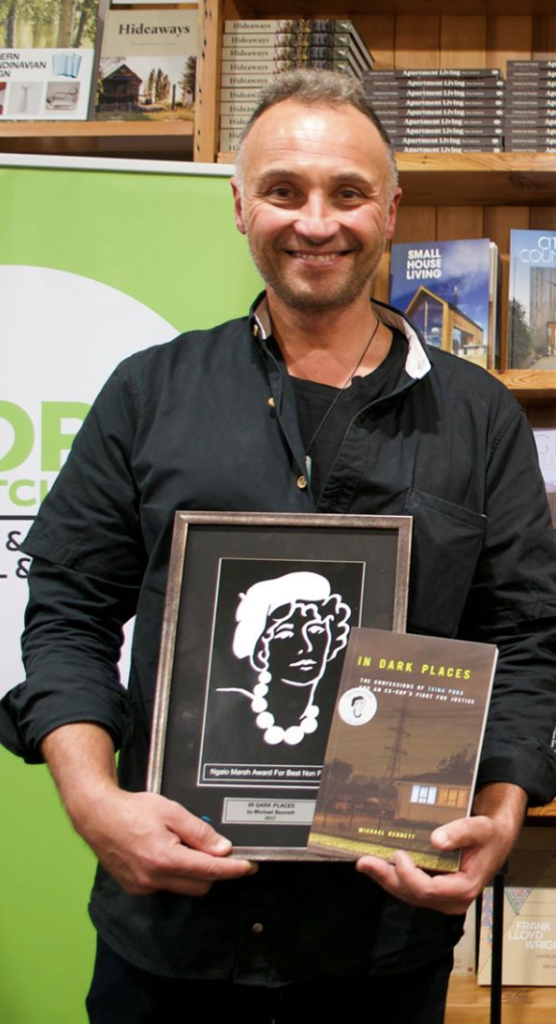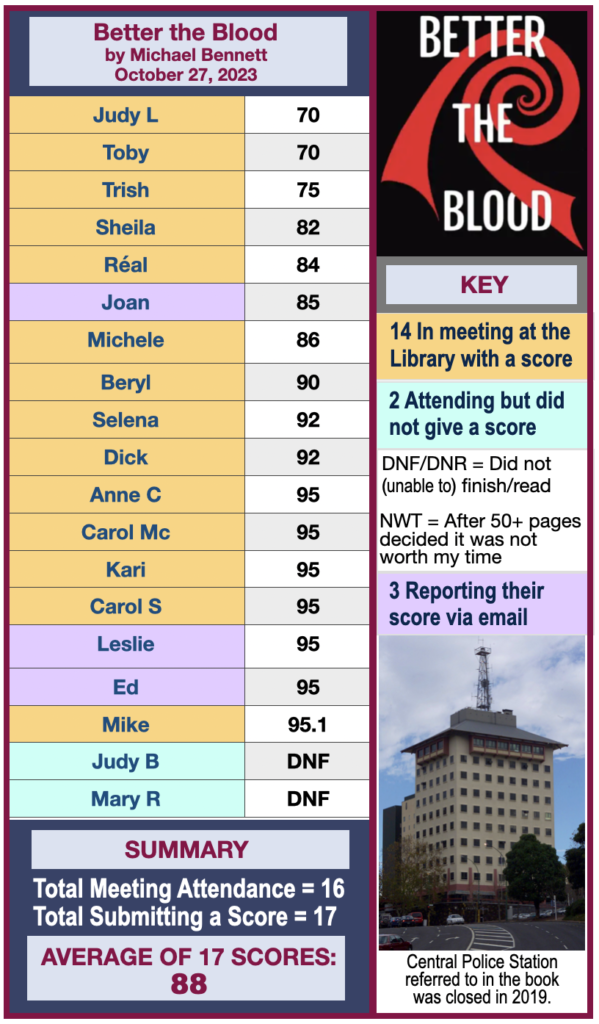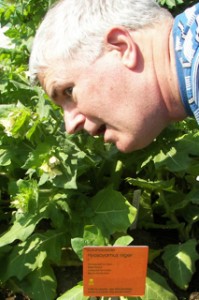Expect spoilers in the bottom half of this post – the beginning of this post is only a repeat of the information provided about the book that was provided at the start of the month, before the meeting. Then halfway down the page we report some of the discussion from the meeting which likely includes spoilers. Your comments, corrections, additions, clarifications are welcome at the end.

We read Better the Blood by Michael Bennett for the October 27, 2023 meeting. This features Hana Westerman, a Māori detective with the Auckland CIB, in New Zealand. The book is already on the list of “Best Debut Mystery-Crime Novels for 2023” at Deadly Pleasures, as well as being a finalist for the Ngaio Marsh Awards in New Zealand (the winners of the 2023 Ngaio Marsh Awards will be announced on Friday 24 November).
BOOK BLURB for Better the Blood:
Set in contemporary New Zealand, Hana Westerman, a tenacious Māori detective, juggles single motherhood, endemic prejudice, and the pressures of her career as she takes on a bizarre case that has links going back eight generations. Worse, it has connections to an event when Hana was a new cop when a Māori Chief was killed, calling into question her loyalties. Twisty and thought provoking.
For more info and reviews, click here: The “long-form” page provided about this book during the voting process.
———————————————————
About the author and book:

Michael Te Arawa Bennett is a New Zealand writer and director for film and television. He is the co-creator, writer, showrunner and executive producer of TVNZ’s Vegas. He is also the author of In Dark Places, a study of the wrongful conviction of Teina Pora for the 1992 murder of Susan Burdett, which won the 2017 Ngaio Marsh crime writing award. [Picture at left after winning the 2017 non-fiction award.]
His 2022 crime novel, Better the Blood, was shortlisted for the Jann Medlicott Acorn Prize for Fiction at the 2023 Ockham New Zealand Book Awards and for the Best Novel at the 2023 Ngaio Marsh Awards. He is Maori and is of Te Arawa descent.
- Hank Philippi Ryan interviewed Bennett last January. Here is the 40 minute recorded interview.
- Barbara Peters, long-time owner of the Poisoned Pen mystery bookstore in Phoenix interviewed Bennett last January as well. Here is the one hour interview. [Early on they discuss New Zealand author Ngiao Marsh, a contemporary of Agatha Christie.]

Meeting Report with Spoilers
Sixteen people attended the October 27 meeting and there was a lot of strong views expressed about the book. Let’s start with the metrics, the book scores.

Ten out of sixteen gave scores of 90 or more. That is a significant recommendation for the book.
A large bulk of the comments related to the big theme in the book, the impact of long-term systemic domination of New Zealand’s indigenous population by the white European colonizers; this includes the impact of physical and emotional abuse, and economic and social discrimination on the indigenous population. Many said the book helped explain “how and why” ethnic, racial, or religious groups whose lives have been trampled on by another group can lead to extreme frustration and ultimately violent events, yet the book emphasized that violence (taking another life) is never acceptable. Several in the discussion saw parallels to the current violence in Israel or treatment of African-Americans throughout US history.
Along those lines, two videos were recommended:
- Ed (via email) recommends this video from NPR Radio called, “It’s one of the toughest anti-smoking laws; the Māori see a major flaw.” By reading or listening to this, you will see how the history of tobacco use in New Zealand has always hurt the Māori more than the white population.
- Dick recommended a video he first saw on a large presentation screen at Portsmouth’s Strawbery Banke museum, called “Pennacook Retribution: Who Shall Judge The Indians Now?” It talks about our own New England indigenous people (at least a bit north of here), the Pennacook Abenaki, and an event in which some of their warriors tortured and killed a key New Hampshire colonial, Col. Richard Waldron in 1689. As I wrote in a newsletter, the film title is similar to the question asked by Raki in our book, “On which side lies evil? The broken man? Or the two centuries of trauma and oppression and injustice that broke him?”
In the fictional Better the Blood, the Māori leaders called for peaceful demonstration decrying Raki’s violence but expressing the hurtful government policies through the years. Both Hana and her daughter found a closeness when they both supported these demonstrations.
Other:
- Like Thirteen (September’s book), there is a serial killer. We know the identity of the killer early in each book which is what earn’s them the designation of more thriller than mystery.
- Unlike Thirteen, the killer’s character is more fully developed. Also the two are very different – Raki gets no pleasure from the killing and supposedly follows his rigid “code” and does not intentionally kill those that oppose him.
- An author video interview that Carol M watched makes clear that there is another Hana Westermann crime fiction thriller in the works.
- Why do you think Hana was able to honestly tell Potoa Raki (A) why she took part as a police officer in the Mt Suffolk protest but had (B) avoided answering that question to herself for 18 years? (B first) She felt she had been a new recruit who really wanted a police career and who was she to oppose her superiors? Also, she felt a great shame in her action, made stronger by her tribal family’s social rejection of her after the Mt Suffolk event. (now A) She told Raki she was ashamed and sorry partly because it was true and partly because she hoped it might help start a negotiated surrender from Raki.
- Many in the group enjoyed learning about the Māori and the impact of the colonial background (Chapter 1: the execution of the tribal chief in 1863).
- Several said they do not prefer stories set in far away places and/or stories with a lot of “history” in them and so did not especially enjoy the book.
- Some questioned the label thriller as there did not seem to be much suspense in the early half.
I regret we did not have enough time for several other topics: Setting, writing quality, and plotting – for example.
PS: In today’s headlines: For New Zealand’s Maori communities, climate change is already hurting
Add to the Discussion about the Book….

Did I miss a key comment made during the meeting? Want to correct or clarify any of the above comments about the book? Want to add an opinion about the book?
(1) for those who did not attend the meeting, and
(2) for those who did attend. Please consider writing some of your thoughts about the book, even if you expressed them in the meeting. This helps provide a “report” to those who could not attend.
Please write your book reactions (and score if not reported above) where it says “LEAVE A REPLY,” below. You can also [nicely] comment on any other participant’s thoughts.



Better the Blood ~ by Michael Bennett ~ mature writing and from so many other aspects of our reference chart ~ good use of setting, character development, plot, dialogue, admirable detective, likable antagonist with deep devotion to his Maori ancestors, especially his Mother ~ Well developed Theme of repression by the British which results impact the Maorian culture to this day ~ and not just their culture but other indigenous culture and black slave trade ~ We as humans have not come very far in so many ways ~ Power over and greed still are the great motivating factors ~ I commend Michael Bennett in writing this book and bringing level of awareness through his writing ~ Ok ~ it is not a ‘classic mystery’ but it is literary and it was an excellent read ~ Raises many issues besides being a ‘good read.’ ~
Lol ~ Maybe ‘it is time for a revolution ~ Yes!